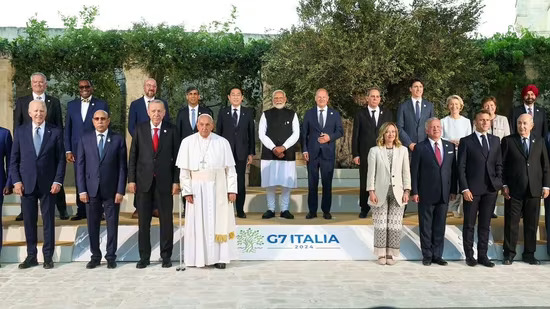
G7 Summit: History, Significance, and Future Directions of G7

(Pic credit- Hindustan Times)
Since its inception in 1975, the Group of Seven (G7) has stood as a pillar of global economic coordination among the world’s most advanced economies. Comprising Canada, France, Germany, Italy, Japan, the United Kingdom, and the United States, the G7 initially formed to address the economic challenges of the time, notably the oil crises of the early 1970s.
Over the decades, it has evolved to tackle a wide range of global issues, from economic stability to environmental sustainability.
Historical Foundation and Evolution of G7
Originally known as the G6 until Canada joined in 1976, the G7 was born out of the need for enhanced economic cooperation among major industrialized nations. The group’s early discussions focused on stabilizing exchange rates, managing global energy supplies, and promoting economic growth. Over time, its agenda expanded to encompass broader issues such as international trade, development assistance, and environmental protection.
The 50th G7 summit was held from June 13 to 15, 2024, at Borgo Egnazia in Fasano, Apulia, Italy. The participating leaders included:
1. Italy
Giorgia Meloni, Prime Minister (Host)
2. European Union
Charles Michel, President of the European Council
Ursula von der Leyen, President of the European Commission
3. Invited Leaders of Countries
- Algeria
- Argentina
- Brazil
- India
- Jordan
- Kenya
- Mauritania (representing the African Union)
- Tunisia
- Türkiye
- Ukraine
- United Arab Emirates
- Vatican City
4. International Organization Guests
- African Development Bank (Akinwumi Adesina, President)
- The International Monetary Fund is led by Kristalina Georgieva as its Chief Operating Officer.
- The Organisation for Economic Co-operation and Development is headed by Mathias Cormann, serving as Secretary General.
- United Nations (António Guterres, Secretary General)
- World Bank
Topics Expected to be Discussed at the 50th G7 Summit
The main topics expected to be discussed at the 50th G7 summit in 2024 include:
Support for Ukraine
The G7 leaders reaffirmed their unwavering support for Ukraine’s sovereignty and demanded clarification on the death of Alexei Navalny. This will remain a key focus of the summit.
Global trade and economic challenges
Prior to the summit, G7 Trade Ministers met to reaffirm their commitment to reforming the WTO and addressing global trade challenges.
Regional conflicts and security
The G7 Foreign Ministers discussed regional conflicts in the Middle East and the Red Sea, condemning terrorist attacks and expressing concerns about Iran’s nuclear program.
Partnerships with Africa
As the G7 President in 2024, Italy emphasized strategic partnerships with Africa as a key priority for the summit.
Ethical use of artificial intelligence
Pope Francis is expected to address the ethical implications of artificial intelligence at the summit.
Energy security and climate change
Given the ongoing global energy crisis, energy security and the transition to clean energy are likely to be high on the agenda.
Migration and cooperation
Italy’s G7 Presidency aims to address migration and strengthen cooperation, especially with the Global South.
Overall, the 50th G7 summit is expected to focus on geopolitical tensions, global economic and trade issues, as well as sustainable development and cooperation with the broader international community.
Relevance and Impact on Global Governance
The G7 holds significant influence in shaping international economic policies and governance frameworks. Its decisions often set the tone for global economic stability and cooperation. For instance, the G7 played a pivotal role in establishing the International Monetary Fund (IMF) and the World Bank, institutions that have been instrumental in stabilizing global finance and promoting development.
Key Achievements and Initiatives
Throughout its history, the G7 has achieved notable successes in addressing global challenges. It has championed initiatives such as debt relief for developing countries, support for global health initiatives like the Global Fund, and efforts to combat climate change through agreements such as the Kyoto Protocol and the Paris Agreement. These initiatives underscore the G7’s commitment to collective action and sustainable development.
Challenges and Adaptation
In recent years, the G7 has faced challenges in maintaining its relevance amidst a shifting global landscape. The rise of emerging economies, geopolitical tensions, and the impacts of technological advancements have tested its ability to address contemporary issues effectively. Critics argue for greater inclusivity and representation in global economic governance to reflect the changing dynamics of the global economy.
Future Directions and Upcoming Events
Looking ahead, the G7 continues to adapt its agenda to meet the evolving needs of the global community. Future G7 summits will focus on pressing issues such as digital transformation, cybersecurity, and pandemic preparedness. The next G7 summit is yet to be scheduled for 2025 but the location will be Canada, where leaders will convene to discuss strategies for economic recovery post-pandemic and reaffirm commitments to sustainable development goals.
Final Thoughts
In conclusion, the G7 remains a cornerstone of global economic governance, providing a forum for advanced economies to collaborate on critical issues. With its history of impactful initiatives and ongoing adaptation to new challenges, the G7 is well-positioned to lead international efforts towards a more resilient and sustainable global economy.
As it prepares for future challenges and opportunities, the G7’s commitment to inclusive growth, environmental stewardship, and global cooperation will be essential. By leveraging its collective strength and influence, the G7 can continue to play a pivotal role in shaping the future of international economic relations and promoting prosperity for all.
For more information on the G7 and its upcoming events, please visit the official websites of respective member countries and international organizations. Stay tuned for updates on the outcomes and decisions from the next G7 summit, where leaders will chart the course for global economic cooperation and development in the years ahead.
Related Posts
Get Curated Post Updates!
Sign up for my newsletter to see new photos, tips, and blog posts.

SEO-savvy content writer and technical specialist with over 5 years of cross-industry experience. MBA graduate dedicated to crafting impactful narratives for your brand.





